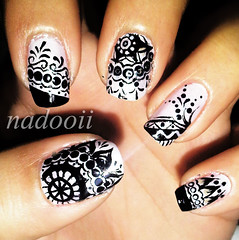Your nails can significantly contribute to the impression you leave
on people. But they can say a lot more about you than just how strongly
you take care of your appearance.
Research reveals that your hair
and nails can be an indicator of your overall health. Healthy hair and
nails have been linked to good nutrition. On the other hand brittle
discolored nails and dull hair, among other conditions, can offer
warning signs of malnutrition, infection and serious disease.
You
probably don’t spend much time looking at your nails and hair.
Abnormalities in these two areas often indicate illness in the body
before the rest of the body will. Although nothing replaces a proper
diagnosis from your doctor, read on to learn how to decode the signs of
ill health.
Are your nails
cracked,
brittle, and quick to break?
That’s often a sign of
iron deficiency, anemia. However, if your tips
seem to crack at the slightest touch, this could be caused by an
underactive thyroid.
White spots on nails, also known as milk spots, are ironically not
signs of calcium deficiency. They are simply a result of
minor injuries
to the nail. In some cases, they are indicators of
zinc deficiency.
Pale
nails, on the other hand, could be a sign of
anemia. Inadequate oxygen
levels in the blood can leave the tissue beneath your nails looking
ghostly. More seriously, pale nails could be a sign of congestive
heart
failure and
liver disease.
The
thickening of nails, often
combined with their
yellowing, is usually a sign of
fungal infection. In
rare cases, yellow nails can indicate a more serious condition such as
thyroid disease.
Rippled or
pitted surface of the nails can be an early sign of inflammatory
arthritis or
psoriasis.
You are what you eat
- While your nails aren’t a living part
of your body, improving your inner health will affect their outer
appearance. Before you invest in all those nail strengthening products
and pills, follow these 10 simple steps to have strong healthy nails by
improving what you eat. After all, you will be tackling the condition
from the core.
- Consuming a balanced diet abundant in fruits and
vegetables, grains, dairy, meat, and good fats will provide you with the
nutrients you need for strong healthy nails and prevent any nutrient
deficiencies. Eliminating one of these food groups may disturb the
balance.
- Nails are layers of keratin, a type of protein. So,
including protein in your diet, from meat, chicken, fish, and eggs, is
essential for their strength.
- Make sure to have one iron rich
food source in your daily diet. You can try these foods: Pumpkin seeds,
pine nuts, lentils, oatmeal, red meat, spinach, dark chocolate, and
tofu.
- Drink more water. It keeps your nails and hair hydrated. Aim for at least 8 cups daily.
- Also, exercise regularly to relieve stress. Brittle, peeling nails
are a common side effect of stress due to the rise of the stress hormone
cortisole.
- Vitamin B7 (biotin) can also reduce your body’s
stress levels. Common dietary sources of biotin are bananas, beans, and
whole grains.
- Keep your thyroid regulated by consuming sufficient
Iodine. It is abundant in dried seaweed, iodized salt, milk, shrimp and
eggs.
- Antioxidants can play a role in your nails as they
can prevent dry weak nails and repair broken tissue. Antioxidant
superfoods you should consider in your diet include berries, green tea,
broccoli, cocoa, and avocados.
- Omega-3 fatty acids, amongst their
countless benefits, promote nail health. This can be found in salmon,
tuna, eggs, sardines, flaxseed, walnuts and almonds
- Excessive
alcohol drinking and smoking can have a negative impact on nail health.
It keeps the liver strained as it excretes toxins from the body.
Now that you’ve been equipped with the right information, make a habit of checking your nails on a weekly basis.
Source



















